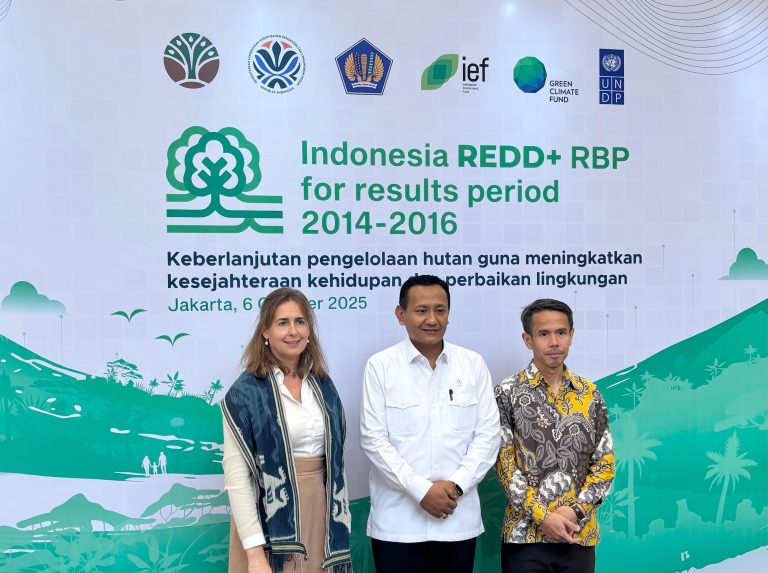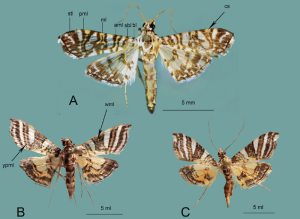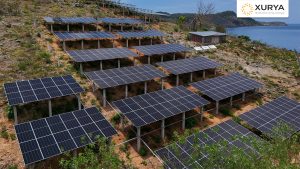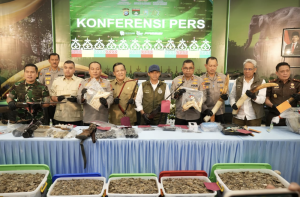Jakarta — Indonesia has secured a total commitment of USD 499.8 million in Result-Based Payments (RBP), according to a statement released by the United Nations Development Programme (UNDP) on Monday, October 6. The RBP was part of Indonesia’s action through measurable success in reducing emissions from deforestation and forest degradation under the Reducing Emissions from Deforestation and Forest Degradation (REDD+) program.
The UNDP said that from the total RBP, USD 340.7 million has already been disbursed, including USD 103.8 million from the Green Climate Fund (GCF) through the UNDP. This milestone underscores Indonesia’s progress toward the FOLU Net Sink 2030 target, where carbon absorption is expected to exceed emissions, supported by 95.5 million hectares of forest cover, the third-largest in the world.
“This project stands as a powerful testament to Indonesia’s leadership in global climate action and to the catalytic role of the Green Climate Fund,” said Hemant Mandal, Director for the Asia-Pacific Region at GCF. He said that the proceeds have strengthened REDD+ implementation, empowered local communities, and aligned the initiative with Indonesia’s updated Nationally Determined Contributions (NDCs).
Tangible impact on forests and communities
The Ministry of Forestry reported that over 2 million hectares of forest and land have been rehabilitated between 2015 and 2024, accompanied by a 19.6% reduction in the extent of forest fires. These achievements have been bolstered by a moratorium on new licenses for primary natural forests and peatlands, as well as social forestry programs and multi-forestry enterprise initiatives that benefit local communities.
“The success of REDD+ proves that low-carbon development can be achieved with transparent governance and the participation of all stakeholders,” said Minister of Environment Hanif Faisol Nurofiq. “This is an important legacy for future generations.”
Minister of Forestry Raja Juli Antoni said that REDD+ not only addresses emissions but also promotes environmental justice, ensuring that Indigenous Peoples and local communities share in the benefits of Indonesia’s climate actions.
Governance and transparency
Indonesia’s robust institutional framework underpins its success with REDD+. Systems such as the Measurement, Reporting, and Verification (MRV) mechanism, the Forest Reference Emission Level, and the National Registry System ensure transparency and accountability. The Safeguards Information System further guarantees gender-responsive implementation and protection for Indigenous and local communities.
The Environmental Fund Management Agency (BPDLH) serves as the national green finance platform, channelling REDD+ funds into forest restoration, critical land rehabilitation, and livelihood programs.
“BPDLH serves as a green financing platform that connects global support, including from the GCF, with concrete action in Indonesia. The REDD+ funding we manage not only supports forest rehabilitation and peatland restoration but also enhances community livelihoods. Transparency, accountability, and inclusiveness are our guiding principles in managing every rupiah of environmental funds,” said Joko Tri Haryanto, President Director of BPDLH.
Partnership with UNDP and the Road to COP30
As an Accredited Entity of the GCF, UNDP supports Indonesia in ensuring that REDD+ financing is effectively managed and inclusive. The collaboration strengthens national and subnational capacity through training, safeguards development, and technical assistance.
“Indonesia’s REDD+ journey is not only about forests, but also about people, livelihoods, and our shared future,” said UNDP Indonesia Resident Representative Sara Ferrer Olivella, adding that by protecting biodiversity and expanding green economic opportunities, Indonesia has shown how climate action drives both economic growth and stronger livelihoods.
As Indonesia prepares its second NDC (2031–2035), targeting up to 60% emission reductions from 2019 levels, the government is reaffirming its commitment to inclusive, transparent, and evidence-based climate action.
With robust collaboration among the Ministry of Environment, the Ministry of Forestry, BPDLH, and UNDP, Indonesia continues to demonstrate that ambitious climate mitigation can advance hand in hand with equitable and sustainable development. (nsh)
Banner photo: (from left to right) UNDP Indonesia Resident Representative Sara Ferrer Olivella, Deputy Minister of Forestry Rohmat Marzuki, and President Director of BPDLH Joko Tri Haryanto. (Source: Nabilla/UNDP)















